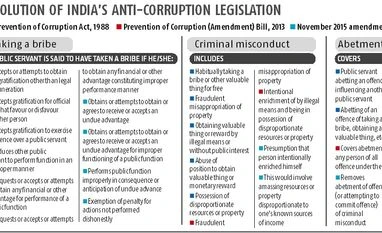The finance minister’s recent comments on the nation’s anti-corruption framework and its effects on decision-making in public sector undertakings (PSUs) and the bureaucracy, have raised hopes that the legislature will take a fresh look at overhauling the Prevention of Corruption Act, 1988 (PC Act) in the ongoing winter session of Parliament.
First enacted almost 30 years ago, India’s anti-corruption statute has been the subject of debate for quite some time. An attempt at amending the law began as early as 2008, but lapsed before it could be passed. Thereafter, the Prevention of Corruption (Amendment) Bill ,2013, was again introduced before the Rajya Sabha, in an effort to streamline the law with the 2005 United Nations Convention of Corruption, to which India became a signatory in 2011. A Law Commission Report (February 2015) stressed on improving efficiency in public operations and incentivising civil servants through protection of honest actions. The report resulted in a series of alterations to the 2013 Bill.
Corporate lawyers point out that the current legislation creates a problem not only in restructuring of non-performing assets, but also affects decision-making and the settlement of disputes involving the public sector. “Generally, no one at a PSU wants to take the risk of settling a prolonged litigation, even if it adds to legal costs,” says Nishant Joshi, partner, Shardul Amarchand Mangaldas & Co.
Sections 7-12 of the current act criminalise public servants from accepting (or attempting to accept) bribe other than legal remuneration, in respect of official functions. The provisions also penalise bribe taking to influence other public servants and the abetment of such offences. The 2013 Bill even made requests for such gratifications a penal offence.
The 2015 amendments now introduce the concept of ‘undue advantage’. These also include a provision exempting public officials from penalty if they have not performed such functions ‘dishonestly’. However, many stakeholders feel that the lack of clarity to these terms open them up to misuse by authorities.
“Exempting honest actions from prosecution is in line with traditional criminal jurisprudence. However, the process will still take years to mature through the evolution of judicial precedents," notes Joshi. Section 13 of the PC Act defines criminal misconduct as an abuse of dominant position, use of illegal means, disregard to public interest, etc. After the 2015 amendments, Clause 6 of the Bill now restricts the applicability of this section on only two grounds — fraudulent misappropriation of property and intentional enrichment by illicit means. The proposed changes also decriminalise the abetment of criminal misconduct.
The 2015 amendments also introduce the necessity of prior sanction from an appropriate authority under the Lokpal and Lokayuktas Act 2013, before commencement of an investigation against a public official. The current law requires sanction only before prosecution of such an offence.
More From This Section
Experts feel this could delay even legitimate cases and even lead to allegations of arbitrariness and favouritism on the part of the government. According to Prianka Rao, senior analyst, PRS Legislative Research, the government would need to strike a balance between reassuring a public official, while also penalising genuine acts of corruption.
Legal provisions aside, the attitude of the magisterial courts dealing with such white collar matters also needs to be business and government friendly, without compromising on juristic standards. “One way to bridge the gap in understanding between a judge and the internal workings of a PSU could be for retired officials of these entities to act as amicus curiae to guide the courts in the judicial process,” notes Shankh Sengupta, partner, Trilegal.
With the recent efforts at curbing black money and corruption through demonetisation still weighing heavy on the public sentiment, the nation’s ability to simultaneously improve governmental efficiency is sure to be put to test in the coming months.
)